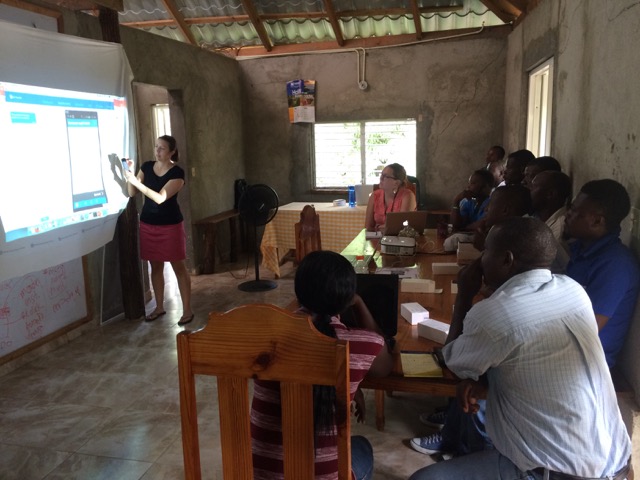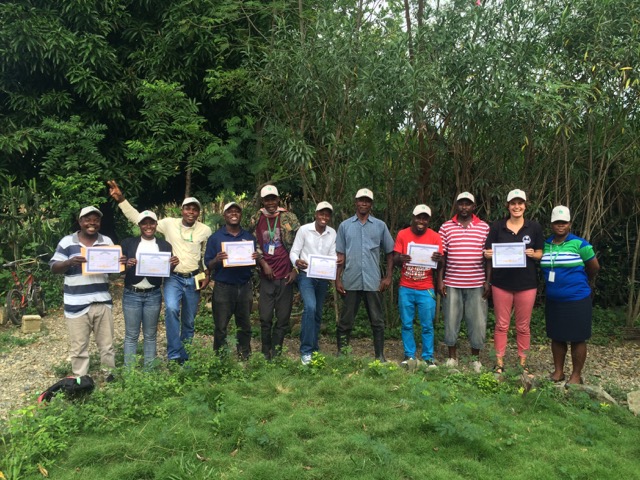
Search
SOIL is a nonprofit in Haiti and TaroWorks client that provides access to safe, dignified sanitation, which produces rich, organic compost as a natural resource. SOIL is using TaroWorks to collect mobile data for EkoLakay, a service that rents and services composting toilets to households in the country’s two largest cities. You can learn more about EkoLakay on SOIL’s website. One of the most difficult parts of a mobile system rollout is ensuring field staff adoption, so we asked SOIL what made this TaroWorks implementation successful.
Using TaroWorks, the SOIL field staff have been able to follow up with prospective households, register new clients, and record monthly payments on their mobile devices. Managers can see instant updates of these activities in Haitian Creole or translated into English.

SOIL field team members prepare for rollout of TaroWorks mobile technology
SOIL expected some hesitation from their field staff, but were happy with how enthusiastic they were and how the training progressed. We get lots of questions about how to make field staff adoption of mobile technology go smoothly, so we asked SOIL’s Systems Director Erica Lloyd for some of the keys to success.
Erica: As with anything new, you have to be really clear about the benefits to the organization and individual users. It helps to answer questions like, “How will this product solve an existing problem, improve productivity and be cost effective?” All of our staff were well-acquainted with the challenges of our previous data management practices (gathering data via paper forms and typing into Excel forms), but we spent a few minutes at the beginning of the training enumerating some of those problems and how moving to TaroWorks/Salesforce would address them. The good news is our field staff were really enthusiastic – I think their positive response shows that people were on the same page about being ready to move on from our previous data collection and analysis system.
Erica: Our staff are busy and stretched in many directions. Sometimes staying with old tools that are far from ideal is easier than learning an entirely new system, so fostering adoption and planning for the rollout needs to start way before training.
Early in our process of testing and refining mobile forms in TaroWorks, we involved our Program Director. He tested our forms on the ground in Haiti, got to know TaroWorks really well, and started organically spreading the word to the other field staff. Because of him, there was already a buzz before training even started.
I also took advice from a TaroWorks Webinar to provide certificates for staff who participated in the training and successfully completed a field test, since adding certifications to your CV can be a major motivator in Haiti.
It also helps to tailor messaging about the change to different groups, emphasizing how these tools will help THEM in their day-to-day work, whether it’s managers or field staff. Once field staff understood how to use TaroWorks – which didn’t take long – they were excited to use their smartphones, and we kept hearing: “This is going to make our service so much more professional and efficient!”
Erica: We scheduled 2 days of in-office training. On our first morning, we dove into the TaroWorks system with an overview of its features, syncing issues and general questions about the solution. That afternoon, we went through each job, demonstrating how to use the system. Then, people partnered up to gain more hands on experience by role playing and taking turns pretending to be the customer. For the second morning, we reviewed information taught on the first day and then had more practice going over jobs. That afternoon, we spent time on troubleshooting tips and going over rules for the phones. The following week, I completed an individual field test with each employee to ensure they were ready to use TaroWorks independently. Repetition can help drive home important information and techniques – as can refresher trainings even after the software has been in use for some time.
Erica: Some of the biggest concerns our field staff brought up centered around losing data or running out of battery life on the job. They worried about what paper documents they still need to fill out. I also noticed that some field staff kept skipping over the button to take the photo.
Erica: We went over these difficulties carefully during our training sessions. For example, we pointed out how to determine if a survey that appeared on their screen had been completed and synced to the cloud database. While we might think certain elements of the software are obvious, the role play was a great way to see how they really interact with the tool. The group forum was a great way for us to discuss solutions together so nobody has to struggle with issues by themselves when they’re actually in the field.
Erica: Know what motivates your field staff. We know that they really value certifications, so we made sure to let them know that they would receive a certificate at the end. My other training tip is to get people interacting and moving!
Our jobs include using offline maps so staff can navigate to a house for the waste pickup or payment collection. For the training exercises, we set up a treasure hunt where we geotagged balloons and boxes of cookies placed around the office, and our staff had to use the app to find the prizes. I think it added an element of fun and kept the staff engaged.
Finally, I’m a huge proponent of using TeamViewer both as a trouble-shooting tool and a presentation mechanism (you can easily project the mobile device screen). It helped our participants follow along step by step, which encouraged field staff adoption. (see photo above).

SOIL’s field team celebrate a successful training session for TaroWorks with their certificates
POST TOPICS
Sign up to receive emails with TaroWorks news, industry trends and best practices.
TaroWorks, a Grameen Foundation company.
Site by V+V